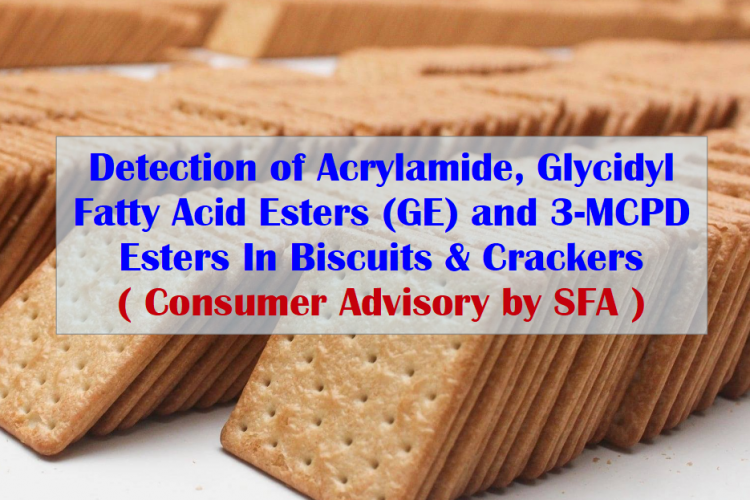The Singapore Food Agency (SFA) is aware of news reports about the detection of acrylamide, Glycidyl fatty acid esters (GE), and 3-MCPD esters in pre-packed biscuits and crackers.
These compounds were described to be genotoxic carcinogens (i.e. a chemical capable of damaging DNA and causing cancer).
SFA is aware of news reports about the detection of acrylamide, Glycidyl fatty acid esters (GE), and 3-MCPD esters in…
Posted by Singapore Food Agency (SFA) on Thursday, October 28, 2021
ABOUT THE COMPOUNDS
According to the International Agency for Research on Cancer (IARC), there is currently no evidence that conclusively demonstrates that acrylamide, GE, and 3-MCPD esters can cause cancer in humans.
These compounds are naturally formed when food products are processed at high temperatures (e.g. frying, baking, roasting, industrial processing) and low moisture.

– Acrylamide is produced naturally in some food (especially starchy food products), due to a reaction between naturally present substances such as sugars and amino acids.
– GE and 3-MPCD esters are formed when vegetable oil is heated to high temperatures, during the refining process to produce fats and oils that meet quality and safety standards for food manufacturing. It is commonly found in food or food ingredients that contain refined fats or oils.

The manufacturing of biscuits and crackers involves food processing at high temperatures and the use of ingredients that contain refined fats and oils. It is therefore expected that acrylamide, GE, and 3-MCPD esters were detected in samples of biscuits and crackers tested.
FOOD SAFETY STANDARDS
There are no international standards that specify limits for acrylamide, GE, and 3-MCPD esters. Codex Alimentarius Commission (CAC), the international standard-setting body for food safety, adopts an “As Low as Reasonably Achievable” (ALARA) approach for these compounds.
This means that manufacturers should reduce the presence of these compounds as much as possible, without adversely impacting the food supply chain. This is because it is impossible to prevent the occurrence of such compounds in food products.
In place of setting maximum limits for these substances, CAC has adopted Code of Practices for the industry to reduce the levels of these substances in food. Singapore, and other countries such as Australia, New Zealand, and the United States, adopts a similar position as the CAC. The EU also provides some benchmark levels to help guide companies to achieve ALARA.
SFA will continue to keep abreast of the latest scientific developments surrounding these compounds, and will continue to monitor these compounds in our food supply to safeguard the health of consumers. Manufacturers are advised to refer to the CAC’s Code of Practices on the reduction of acrylamide esters, glycidyl esters and 3-MCPD esters in food.
CONSUMER ADVISORY
Biscuits and crackers are safe to consume when eaten in moderation. Consumers are advised to avoid the excessive consumption of food processed at high temperatures such as fried, baked, and roasted food.




